Cafes, Bookstores Across Iran Closed For Breaking Hijab Laws
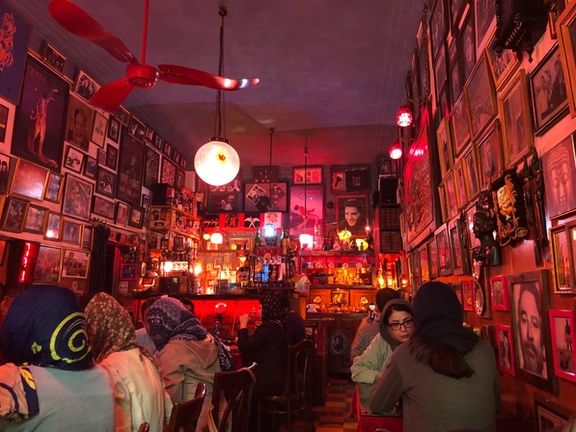
Amidst tightening hijab laws, numerous cafes and bookstores in Tehran, Mashhad, Tabriz, and a range of other cities in Iran have been closed.

Amidst tightening hijab laws, numerous cafes and bookstores in Tehran, Mashhad, Tabriz, and a range of other cities in Iran have been closed.
In Alborz province, the police commander of Savojbolagh, Ali Soleimani, announced the closure of 9 out of 12 traditional cafes and restaurants visited during the implementation of the "Social Security Plan."
Simultaneously, in Semnan province, 23 shops were closed for "failure to observe Islamic norms."
In Esfahan province, police sealed two restaurants and four hair salons in the city for Falavarjan for “non-compliance with compulsory hijab” under the "Social Security Plan."
The wave of closures continues in Mashhad, where, in recent months, numerous cafes have been sealed for failure to observe compulsory hijab. On Tuesday, law enforcement commanders sealed Gorilla Café, a recently opened establishment. Meanwhile, Bakhtiari Café in Tabriz was sealed on November 11 by supervisory authorities for "failure to observe compulsory hijab."
A police official from Eslamshahr in the vicinity of Tehran revealed Saturday the closure of 121 shops and the confiscation of over 500 vehicles in the city due to non-compliance with compulsory hijab.
Hijab police have also been ramped up in Tehran metro stations.
The ongoing crackdown on women removing compulsory hijab, intensified after the death of Mahsa Amini during her detention by the morality police, has gained momentum.
The closure of commercial, business, and tourist facilities, hotels, administrative establishments, as well as internet companies, reflects the Iranian regime's inability to deal with women who defy hijab.

The Islamic Republic's government has warned travel agencies in Iran against marketing tours abroad featuring concerts by California-based Iranian pop singers.
The directive, issued by the General Directorate of Cultural Heritage, Tourism, and Handicrafts of Tehran Province, targets tours marketed by Iran-based agencies that include performances by diaspora singers that usually take place in neighboring countries. The action highlights a growing tension between the Iranian authorities and artists from the diaspora.
In the recent letter directed to travel and tourism agencies in Tehran, Parham Janfeshan, the director-general of cultural heritage, tourism in Tehran Province, expressed concerns about certain travel agencies advertising and selling tickets for concerts by certain singers, including those from Los Angeles. The communication underscored the importance of adherence to “Islamic values” and warns against potential violations.
The warning includes threats that the travel offices involved in the promotion and sale of services related to these concerts will be referred to a special committee for decision on possible penalties.
Hormatollah Rafiei, the head of the guild for Travel Service Offices and Tourism, warned against violations and emphasized that travel agencies operating permits exclude the right to promote these concerts.
Since the Revolution in 1979 -- when pop music was declared "haram" (forbidden) by the founder of the Islamic Republic Rouhollah Khomeini, Iranians have found ways to follow pop music they love. With domestic performances restricted to a very narrow type of regime-approved songs, a vibrant tradition emerged – Iranians began to travel to nearby countries to attend concerts by their favorite singers from the diaspora.

Primarily based in Los Angeles, these Iranian-American pop stars, barred from performing in their homeland, draw substantial crowds during tours in countries like Turkey, the UAE, Azerbaijan, Georgia, Armenia, and Erbil in Iraqi Kurdistan. These destinations are financially more affordable for Iranians, with fewer visa requirements.
The Los Angeles region is home to the world’s largest Iranian community outside of Iran and has been a scene of anti-Islamic Republic protest rallies especially since the start of the Women, Life, Freedom movement. There are about 400,000 Iranian-born immigrants in the United States and their children. More than a third of them live in the Los Angeles metropolitan region, according to data from the Migration Policy Institute.
Iranian pop stars enjoy significant popularity also among expatriates in European countries. Singer-songwriters Shahin Najafi and Mohsen Namjou are noteworthy artists based in Europe, boasting a sizable fan base of Iranian expatriates.

The popularity of foreign-based artists surpasses that of their Iran-based counterparts, forming a global community of Iranian music enthusiasts who overcome travel obstacles to enjoy performances prohibited in their country. To gauge their popularity, one can contrast Iranians spending an average of $200 per ticket for concerts by Iranian stars like Ebi, Dariush, or Googoosh in Turkey or Dubai with the popularity of international stars like Taylor Swift and Beyoncé. In Iran, concert tickets typically range from $5 to $10.
Warnings against going to such concerts were issued in previous years when these events were more regularly organized in neighboring countries. However, the recent campaign underscores an escalating divide, intensified by last year's Women, Life, Freedom protests. The nationwide revolt, sparked by the death in custody of 22-year-old woman Mahsa Amini, saw numerous exiled Iranian stars rallying behind the people and denouncing the regime's suppression of dissent.
The majority of these singers utilized their concerts as a platform to amplify the voices of Iranian protesters globally. Concerts by Iranian expatriates commonly featured images of iconic protesters harmed, detained, or killed by Iran's security forces, accompanied by chants against the Islamic Republic.
Iranian state-run media has consistently published reports criticizing the so-called Los Angeles singers, alleging that they take advantage of popular protests for personal gain. At the same time, the Islamic Republic detained renowned singer Mehdi Yarrahi after releasing a song in support of the opposition to the mandatory hijab, while Shervin Hajipour’s revolution song ‘Baraye’ was crowned the Best Song for Social Change at the Grammys 2023.
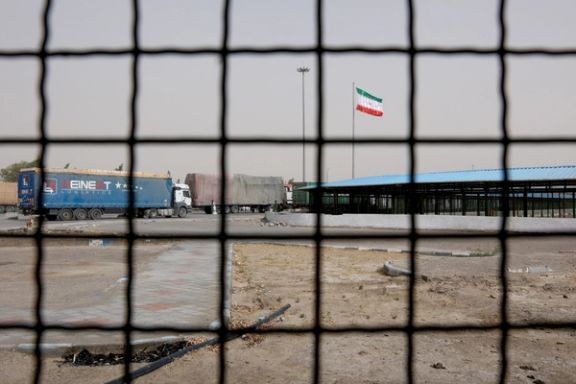
Afghan refugees are trafficked to Iran in a very coordinated manner and officials, from border police to authorities issuing legal documents might be involved, a recent report has revealed.
An investigative report published on Wednesday about the system behind the trafficking on Farazdaily, a news website in Tehran, featured interviews with people smugglers and refugees.
Currently, the Iranian government is being criticized for its seemingly lenient approach to Afghan refugees. Political opponents of the government have repeatedly warned of its "open borders" policy and possible hidden agendas. In response, the government has accused critics of inciting "Afghan-phobia" as a response to fast-growing anti-Afghan sentiment.
President Ebrahim Raisi’s administration is under scrutiny for allegedly trying to encourage the growth of the Afghan population in Iran, either to compensate for the decline of the native population, or to bolster its military by recruiting young Shiite Hazara Afghans immigrants. Iran has used thousands of Afghan fighters in the Syrian civil war to support strongman Bashar al-Assad.
Trafficking Afghans to Iran is a very secure and coordinated process, and there's little chance of getting caught, smugglers told Mostafa Kamali, the journalist behind the Farazdaily investigation.
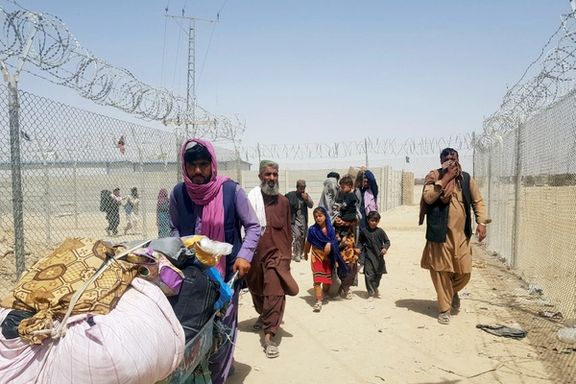
This claim implies some involvement on the part of officials.
“Afghan smugglers are influential individuals who assure immigrants they will reach Iran safely and without any problems,” explains one trafficker.
“Sometimes it is possible to collude with others,” the smuggler adds, explaining that he pays soldiers manning the Afghan-Pakistan and the Pakistan-Iran borders and coordinates with them that at a certain hour, the cars will be crossing the border.
Also, he claims that some Afghans in Iran pay money to "some people" to get residency, without naming any organizations.
According to the report, the illegal migration “mafia” is also at least partially associated with the Afghan Taliban army and nobles.
In most cases, Afghans enter Iran through the Milak border crossing in the southeastern province of Sistan-Baluchistan, and they settle in Mashhad, Tehran, Shiraz and other cities where there are job opportunities, the smugglers explain.
Additionally, some businesses are interested in refugees and are willing to accept the cost of their being smuggled into the country.
"There are times when an Iranian asks for an Afghan laborer; when this happens, the immigrant does not have to pay any fees,” describes another smuggler.
However, the extent of the illegal immigration, which existed for the past four decades has reached new levels in the past two years. The smugglers refer to the system behind human trafficking as a “mafia”. “Can you imagine how many millions of Afghans live in Iran right now? A number like this cannot be accounted for by ten or twenty Afghan smugglers.”
Afghan immigration to Iran dates back to the early 1980s when they first arrived as refugees. As time progressed, they transitioned to becoming economic migrants.
Afghan refugees have been streaming through the border in recent years, with their total number now estimated to be between 6 to 7 million, according to the Iranian Parliament’s Research Center expert.
“After the Taliban's takeover of the Afghan government in 2021, we have definitely faced a flood of migration”, Mostafa Jahanbakhsh told IRNA state agency in October.
In the years prior to the Taliban's takeover, the total number of Afghans in Iran rarely exceeded two million.
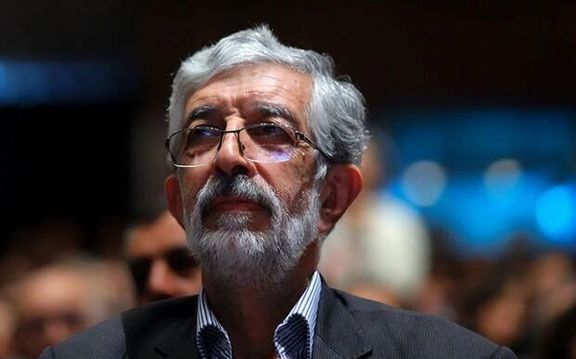
Former Iranian Parliament Speaker Gholam Ali Haddad Adel, a figure close to Iran's ruler Ali Khamenei, has cautioned against Iran's participation in the Gaza war.
In a TV interview on Friday, the close relative of Supreme Leader Ali Khamenei stated that “Israel aims to transform the Gaza conflict into a war between Iran and the United States.”
The Expediency Council also warned that if such a scenario unfolds, the primary beneficiary of a secure existence would be the "Zionist regime”, the term used to refer to the Jewish state now at war with Iran-backed Hamas.
The proscribed terror group invaded Israel on October 7 and the US immediately backed the country’s right to defend itself in the wake of an attack which was the single most deadly day for Jews since the Holocaust.
His warning aligns with the recent sentiments expressed by former President Hassan Rouhani, who cautioned against Iran getting entangled in the Israel-Hamas conflict in Gaza. Rouhani highlighted the risk Iran faces due to its role in fueling the conflict and underscored the potential consequences of direct or indirect involvement, stating that “a wrong decision could draw the flames of war towards Iran.”
Former Foreign Minister Mohammad Javad Zarif also weighed in, stating that if Iran is dragged into the Israel-Gaza war, the consequences would fall on the people, not the state officials.
The conflict has resulted in the most severe escalation in the Gaza Strip since Hamas took control in 2007. Iran's proxies in Syria, Lebanon, Iraq, and Yemen have become involved, despite Tehran's continued denials of direct involvement.
The United States has strongly supported its ally Israel, mobilizing warships and troops in response to the attack. As a result, the alliance has also since led to US facilities in Syria and Iraq coming under fire from Iran's proxies in dozens of attacks.
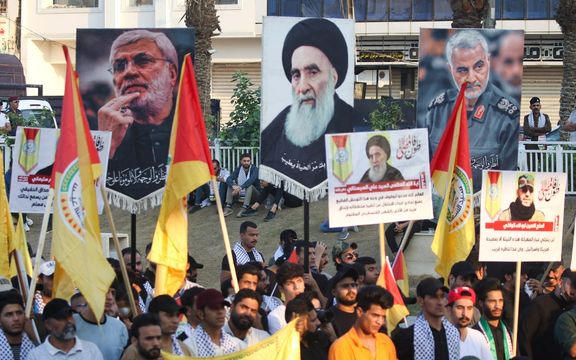
Washington sanctioned an Iran-backed militia group in Iraq on Friday for targeting US troops, after it approved the release of billions of dollars to Iran this week.
The US Treasury on Friday named six people that have been sanctioned because of their affiliation with Kata’ib Hezbollah., which itself has been added to the US terror list. Among those targeted is a member of the IRGC Quds Force, who the administration says facilitates travel and training of Kata’ib Hezbollah fighters in Iran.
"Today’s action sends a message to Kata’ib Hizballah and all other Iran-backed groups that the United States will use all available measures to hold to account any opportunistic actors who seek to exploit the situation in Gaza for their own ends," a Treasury official said.
Iran proxies have been attacking US forces ever since Israel invaded Gaza in retaliation for the October 7 Hamas terror attack.
On Friday, a Pentagon official told Iran International that multiple one-way drones had been launched against US positions in Syria and Iraq, bringing the number of such attacks to 62 in 31 days.
It’s not clear if the newly introduced sanctions can have a meaningful impact on the dynamics on the ground. The regime in Iran and its proxies have been dealing with various forms of sanctions for a long time.
The sanctions will freeze assets of the sanctioned individuals and entities in the US and generally bar Americans from dealing with them. But this will hardly deter the militia if they have little or no material relation or connection with the US.
The Biden administration seems to be reluctant to widen or deepen the conflict. Despite all the tough talk from Biden and his team, the American military has only launched a few airstrikes on IRGC-affiliated positions in Syria and Iraq to deter their daily attacks.
Biden critics say his leniency in dealing with Iran is at least partly to blame for the current situation by emboldening Tehran to advance its regional agenda with relative impunity.
"President Biden’s failure to respond to attacks by Iran and its proxies has put American troops in danger, said Senator Tom Cotton Tuesday. “We have to make Iran once again fear us before more Americans die.”
In the past few weeks, the US has deployed warships and air defense systems to the region, amid concerns that Israel’s onslaught of Gaza could trigger other groups such as Hezbollah in Lebanon to officially enter the scene, putting the whole region ablaze and endangering American troops stationed across the Middle East.
According to Reuters, the US military is taking new measures “to protect its Middle East forces during the ramp-up in attacks by suspected Iran-backed groups” and is leaving open “the possibility of evacuating military families if needed.”
The United States has 900 troops in Syria, and 2,500 more in neighboring Iraq.
On Thursday, Senators Lindsey Graham and Richard Blumenthal introduced legislation that urges Biden to attack Iran in case an American soldier was killed in Syria or Iraq.
“If an American is killed… then the target should be in Iran,” said Senator Graham in the press briefing for the initiative. “They need to pay a price they haven’t paid yet. That price should be the IRGC infrastructure… and the oil refineries.”
Many US lawmakers, including some within Biden’s Democratic Party, have become more critical of the administration due to what they see as letting the Iranian regime off the hook and refilling its coffers.
“Pres. Biden and his team decided early on that, if they were just nice to Iran, Iran would be nicer to us. As a result of that, Iran has been able to earn billions more from oil and got $4.5B in money via the IMF,” said Senator John Kennedy in an interview Friday.
The administration’s decision earlier this week to grant another sanction waiver to enable Iraq to pay Iran for electricity has enraged many lawmakers.
“Make no mistake,” Rep. John James wrote in a post on X, “the money we're allowing Iran to have will go toward killing Americans and Jews, and Biden is allowing it to happen with his ignorance, naivety, and complete lack of understanding of how global politics works. We must hold them accountable.”
The administration says that the Iranian government will not receive in hard currency in cash and can only purchase non-sanctionable goods with the funds that will be kept in Oman. However, critics say that if Tehran can import food and medicine with the funds, it can allocate it own dollars and euros from oil exports to destructive activities.

Iran witnessed a significant disruption in the country's internet services, with complete outages reported in certain areas on Saturday, the anniversary of Bloody November.
Users on social media platforms reported widespread difficulties accessing foreign websites and Gmail services.
Shortly after the severe disruption, government-affiliated media outlets announced that the issue had been resolved. Tasnim News Agency, linked to the Revolutionary Guard, attributed the problem to issues in some internet service providers. The agency stated, "The reported internet disruption in parts of the country, especially Tehran, has been resolved. Problems in certain internet service providers were the temporary cause," in a denial of its own responsibility in spite of a history of internet shutdowns.
The disruption coincides with the anniversary of the nationwide protests in Iran, known as Bloody November, which occurred in 2019. Initially triggered by a significant increase in fuel prices, the demonstrations quickly evolved into calls for the overthrow of the government and Supreme Leader Ali Khamenei. It was one of the worst bouts of civil uprising since 1979.
A rights group's report indicates that during the events from November 15 to 17, at least 3,000 protesters were killed by the Islamic Republic security forces, with nearly 20,000 individuals arrested. Reuters, at the time, reported 1,500 deaths.
The same internet outages were prevalent in the lead-up to the Mahsa Amini anniversary in September, the young lady who died in morality police custody last year, triggering the Women, Life, Freedom protests.
This year has seen a more aggressive push by hardliners in the Iranian parliament to ratify legislation that would further restrict access to social media and the internet as crackdowns on anti-regime sentiment continue unabated.